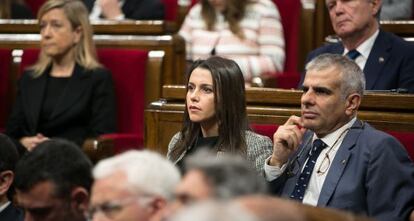Opposition parties ask PM for joint effort against Catalan separatists
Socialists, Ciudadanos and PP maneuver to delay independence process for a few days

Spain’s main opposition parties want to work with Prime Minister Mariano Rajoy of the Popular Party (PP) to counter recent moves by Catalan separatists, who are threatening to ignore Spanish laws in their bid for independence.
The leaders of the Socialist Party (PSOE) and Ciudadanos (Cs), Pedro Sánchez and Albert Rivera, have asked Rajoy to keep them appraised of his upcoming decisions regarding the Catalan secession bid.
Today we have seen a declaration by one half that does not take into account the other half”
Iñigo Errejón, Podemos
The potential effects of cross-party cooperation were put to the test on Wednesday morning when Cs, the Catalan Socialists (PSC) and the PP managed to delay parliamentary approval of the separatist declaration for a few days.
However, the maneuver fell short of full cooperation as the Cs and PSC each filed separate motions at the regional parliament requesting that the bill not be taken to the floor.
This effectively puts the text on hold until the committee of parliamentary spokespeople assembles to draw up each day’s agenda. But this group cannot meet yet because the PP has failed to appoint a spokesperson, and will likely wait until the November 5 deadline before doing so.
Exceptional measures
Pressed to explain just what he means to do if Catalan secessionists make good on their plans to ignore any adverse rulings by the Spanish Constitutional Court, Prime Minister Mariano Rajoy on Wednesday replied that “I wouldn’t like to have to apply article 155 of the Constitution.”
This article, which requires an absolute majority approval by the Senate, allows the head of government to suspend an autonomous region’s activities, and would represent an unprecedented move in Spanish democratic history.
Also on Wednesday morning, Rajoy said he would call both Sánchez and Rivera to La Moncloa, the seat of government, to exchange views on the Catalan question.
However, he will not be calling Podemos leader Pablo Iglesias because the latter supports the right to self-rule – even though Podemos has also criticized Tuesday’s declaration by Catalan separatists announcing “the beginning of the process to create an independent Catalan state.”
With a general election coming up on December 20, so far each party has been going its own way on the issue of Catalan separatism.
Although the PP, PSOE and Cs disagree on how to deal with the independence bid, all three are making a firm defense of the rule of law across all Spanish territory.
The Catalan declaration states that the independence process “will not depend on the decisions of Spanish institutions, most particularly the Constitutional Court,” a body that is described as “having lost its legitimacy.” This statement has been construed as an official call to disobey the law.
“We are going to beat secessionism with the strength of the law, of votes and of politics,” said Socialist leader Pedro Sánchez on Tuesday. After asking Catalan premier Artur Mas and his supporters to “drop the rhetoric of victimization,” he said he had already been briefly in touch with the Spanish prime minister to inquire about the issue.
“Pedro Sánchez is ready to listen and cooperate with Rajoy to defend the law and the integrity of Spain,” said sources who are close to the Socialist leader.
Meanwhile, Rivera stressed the need for unity “in the face of the serious problem developing in Catalonia.” His party, Ciudadanos, began life as a Catalan anti-nationalist party that recently made the jump to national politics.
After good results at local and regional elections in May, Ciudadanos also became the second most-voted force at the Catalan elections in September, showcasing the division between separatists and unionists within the northeastern region itself.
Meanwhile, anti-establishment party Podemos called the Catalan declaration “unacceptable.”
“Problems are not solved by creating two blocs, and today we have seen a declaration by one half that does not take into account the other half,” said Podemos number two official Iñigo Errejón.
English version by Susana Urra.
Tu suscripción se está usando en otro dispositivo
¿Quieres añadir otro usuario a tu suscripción?
Si continúas leyendo en este dispositivo, no se podrá leer en el otro.
FlechaTu suscripción se está usando en otro dispositivo y solo puedes acceder a EL PAÍS desde un dispositivo a la vez.
Si quieres compartir tu cuenta, cambia tu suscripción a la modalidad Premium, así podrás añadir otro usuario. Cada uno accederá con su propia cuenta de email, lo que os permitirá personalizar vuestra experiencia en EL PAÍS.
¿Tienes una suscripción de empresa? Accede aquí para contratar más cuentas.
En el caso de no saber quién está usando tu cuenta, te recomendamos cambiar tu contraseña aquí.
Si decides continuar compartiendo tu cuenta, este mensaje se mostrará en tu dispositivo y en el de la otra persona que está usando tu cuenta de forma indefinida, afectando a tu experiencia de lectura. Puedes consultar aquí los términos y condiciones de la suscripción digital.








































